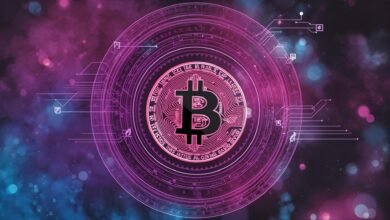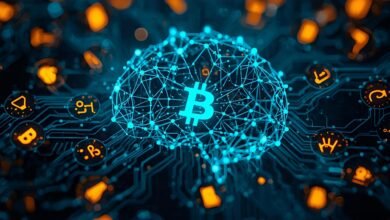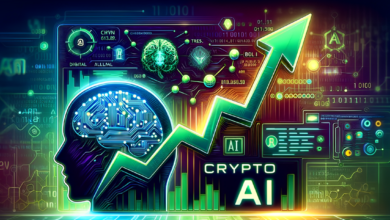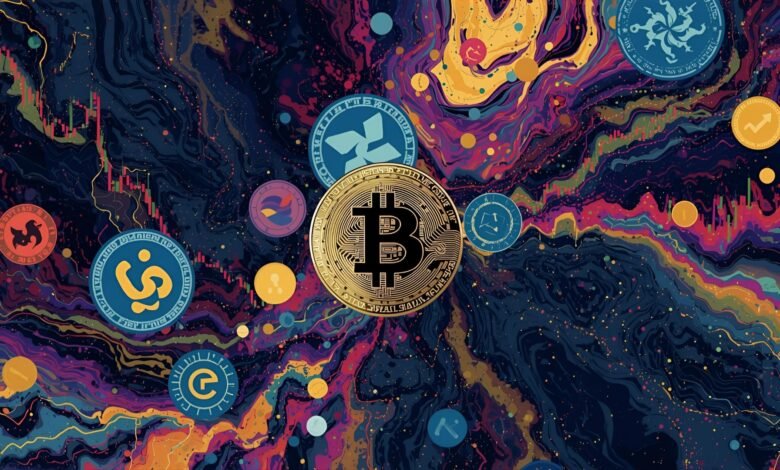
The intersection of artificial intelligence and blockchain technology has given rise to one of the most exciting and rapidly growing sectors in the cryptocurrency market. AI crypto coins represent a revolutionary fusion that combines the computational power of artificial intelligence with the decentralized nature of blockchain networks, creating a market valued at an astounding $36 billion as of 2024.
This unprecedented growth reflects the increasing recognition that artificial intelligence cryptocurrencies are not merely speculative investments but fundamental building blocks for the next generation of digital infrastructure. From machine learning algorithms that optimize trading strategies to AI-powered decentralized applications (dApps) that enhance user experiences, these innovative projects are reshaping how we think about both blockchain technology and artificial intelligence.
The AI crypto market has emerged as a distinct category within the broader cryptocurrency ecosystem, attracting billions of dollars in investment from institutional investors, venture capital firms, and retail traders alike. Unlike traditional cryptocurrencies that primarily focus on peer-to-peer transactions or store of value propositions, AI blockchain projects leverage sophisticated algorithms, neural networks, and machine learning capabilities to solve real-world problems across various industries.
What makes this sector particularly compelling is its potential to address some of the most pressing challenges facing both the cryptocurrency and artificial intelligence industries. For blockchain networks, AI integration offers solutions for scalability, security, and efficiency issues that have long plagued decentralized systems. For AI development, blockchain technology provides the infrastructure for decentralized computing power, data sharing, and incentive mechanisms that can accelerate innovation and democratize access to artificial intelligence tools.
The rapid adoption of AI-powered tokens has been fueled by several key factors, including the increasing mainstream acceptance of artificial intelligence technologies, the growing demand for decentralized computing resources, and the recognition that blockchain networks can provide the transparent and secure infrastructure needed for AI development. Major technology companies, financial institutions, and government organizations are now actively exploring how AI cryptocurrency projects can enhance their operations and create new revenue streams.
As we delve deeper into this fascinating intersection of technologies, we’ll explore the fundamental concepts behind AI crypto coins, examine the most promising projects currently driving market growth, analyze investment strategies and market dynamics, and look ahead to the future trends that will shape this revolutionary sector in the years to come.
AI Crypto Coins: Fundamentals and Core Concepts
AI crypto coins represent a sophisticated category of digital assets that integrate artificial intelligence capabilities directly into blockchain networks and cryptocurrency ecosystems. These innovative tokens go beyond simple payment mechanisms, incorporating machine learning algorithms, neural networks, and automated decision-making processes to create more intelligent and efficient blockchain applications.
What Are AI Cryptocurrency Projects?
At their core, AI cryptocurrency projects are blockchain-based platforms that utilize artificial intelligence to enhance various aspects of decentralized networks. These projects typically fall into several distinct categories, each addressing different use cases and market needs. Some focus on providing decentralized computing power for AI training and inference, while others develop AI-powered trading algorithms, predictive analytics tools, or automated governance systems.
The fundamental value proposition of artificial intelligence cryptocurrencies lies in their ability to combine the transparency and decentralization of blockchain technology with the computational efficiency and learning capabilities of AI systems. This combination creates new possibilities for automated market making, intelligent resource allocation, predictive modeling, and adaptive network protocols that can evolve and improve over time without human intervention.
Key Technologies Behind AI Blockchain Integration
AI blockchain projects leverage several cutting-edge technologies to achieve their objectives. Machine learning algorithms enable these platforms to analyze vast amounts of data, identify patterns, and make predictions about market trends, user behavior, and network performance. Neural networks provide the computational framework for complex decision-making processes, while natural language processing capabilities allow for more intuitive user interfaces and automated content generation.
Smart contracts play a crucial role in AI-powered tokens, serving as the bridge between artificial intelligence algorithms and blockchain execution environments. These self-executing contracts can incorporate AI-driven decision-making processes, enabling automated responses to changing market conditions, dynamic pricing mechanisms, and intelligent resource distribution based on real-time network demands.
The Role of Decentralized Computing in AI Development
One of the most significant contributions of the AI crypto market is the democratization of computing resources needed for artificial intelligence development. Traditional AI research and deployment require substantial computational resources that are typically controlled by large technology companies. AI cryptocurrency projects are changing this paradigm by creating decentralized networks where individuals and organizations can contribute computing power in exchange for tokens, creating a more accessible and distributed approach to AI development.
These decentralized computing networks enable researchers, developers, and entrepreneurs to access powerful AI capabilities without the need for massive infrastructure investments. This democratization is particularly important for emerging markets and smaller organizations that previously lacked access to the computational resources necessary for advanced AI research and deployment.
Top AI Crypto Projects Driving Market Growth
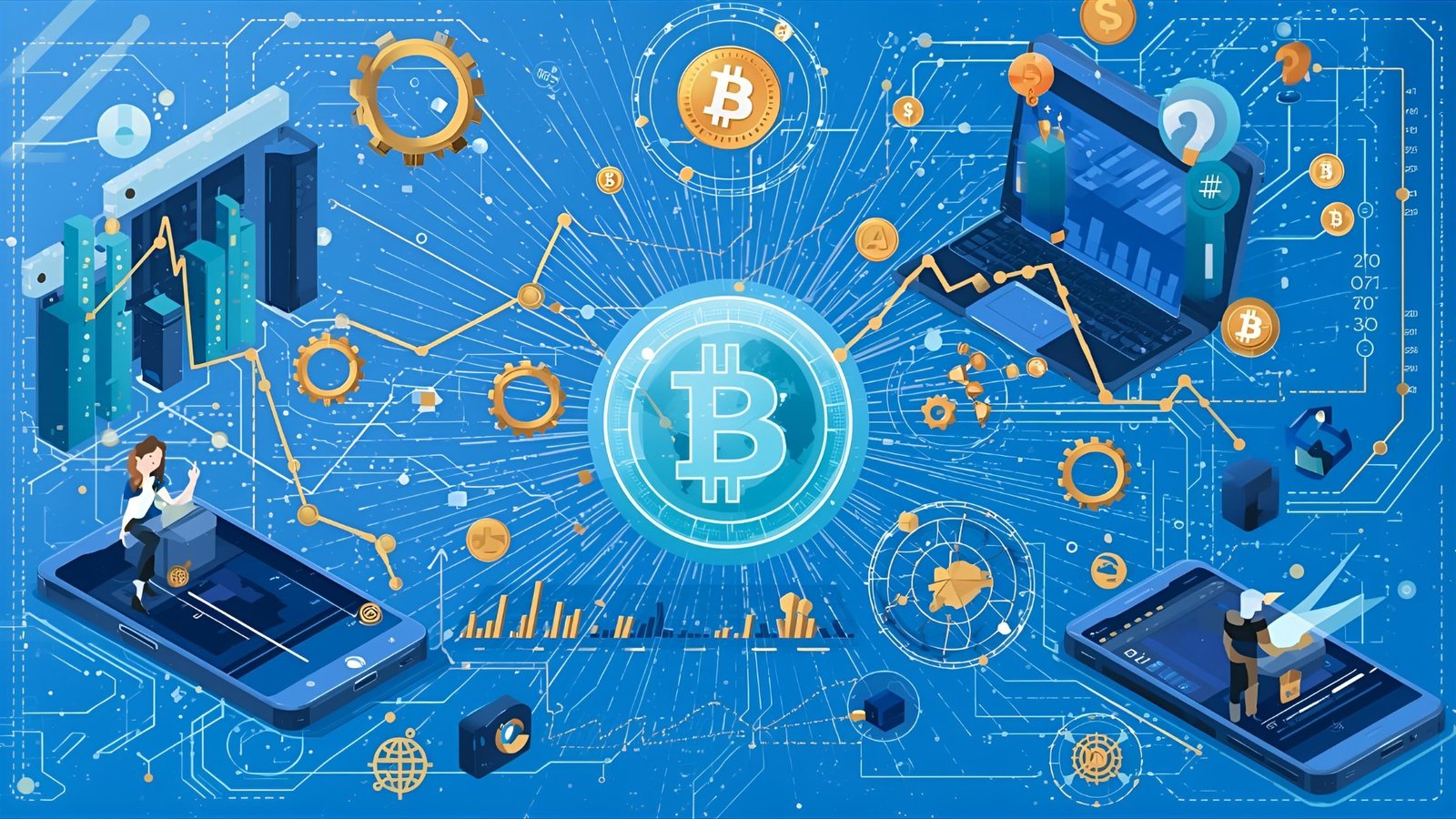
The AI crypto coins sector is dominated by several innovative projects that have demonstrated significant technological advancement and market adoption. These leading platforms are setting the standard for how artificial intelligence can be effectively integrated with blockchain technology to create valuable and sustainable ecosystems.
SingularityNET (AGIX): The Decentralized AI Marketplace
SingularityNET represents one of the most ambitious AI cryptocurrency projects in the market, creating a decentralized marketplace where AI services can be bought, sold, and integrated across different platforms. The project’s native token, AGIX, serves as the medium of exchange within this ecosystem, enabling seamless transactions between AI service providers and consumers.
The platform’s unique approach to artificial intelligence cryptocurrencies focuses on creating interoperability between different AI systems, allowing for the development of more sophisticated and capable artificial general intelligence (AGI) systems. By providing a decentralized infrastructure for AI development and deployment, SingularityNET is addressing one of the most significant challenges in the artificial intelligence industry: the fragmentation of AI services and the lack of standardized protocols for AI interaction.
Fetch.ai (FET): Autonomous Economic Agents
Fetch.ai has pioneered the concept of autonomous economic agents (AEAs) that can negotiate, trade, and interact on behalf of individuals, devices, and services. The AI-powered tokens within the Fetch.ai ecosystem enable these digital agents to perform complex tasks autonomously, from optimizing supply chain logistics to facilitating peer-to-peer energy trading.
The project’s innovative approach to AI blockchain projects demonstrates how artificial intelligence can be used to create more efficient and responsive economic systems. By enabling autonomous agents to make decisions and execute transactions without human intervention, Fetch.ai is creating new possibilities for automated business processes and intelligent resource allocation.
Ocean Protocol (OCEAN): Data Exchange for AI
Ocean Protocol addresses the critical need for high-quality data in AI development by creating a decentralized data exchange platform. The AI crypto market benefits significantly from Ocean’s approach to data monetization and sharing, enabling data providers to maintain control over their assets while making them available for AI training and research purposes.
The platform’s token economics create incentives for data sharing and quality assurance, ensuring that AI cryptocurrency projects have access to the diverse and comprehensive datasets necessary for developing robust artificial intelligence systems. This approach is particularly valuable for machine learning applications that require large amounts of training data to achieve optimal performance.
Render Network (RNDR): Decentralized GPU Computing
The Render Network has emerged as a crucial infrastructure provider for the AI crypto coins ecosystem by creating a decentralized marketplace for GPU computing power. As artificial intelligence applications become increasingly computationally intensive, the demand for efficient and cost-effective rendering and processing capabilities continues to grow.
By tokenizing GPU resources and creating a peer-to-peer network for computational power sharing, Render Network is addressing one of the most significant bottlenecks in AI development: access to high-performance computing resources. This approach not only reduces costs for AI developers but also creates new revenue streams for individuals and organizations with underutilized GPU capacity.
Investment Strategies and Market Analysis
The AI crypto market presents unique investment opportunities and challenges that require careful analysis and strategic planning. Understanding the various factors that influence the value and growth potential of artificial intelligence cryptocurrencies is essential for making informed investment decisions in this rapidly evolving sector.
Market Dynamics and Valuation Factors
AI cryptocurrency projects are valued based on several key factors that differ from traditional cryptocurrencies. Technical innovation and the practical application of artificial intelligence capabilities play a crucial role in determining long-term value, as investors seek projects that demonstrate real-world utility and competitive advantages in their respective niches.
The adoption rate of AI services within each platform’s ecosystem serves as a critical indicator of project health and growth potential. AI-powered tokens that facilitate active and growing networks of users, developers, and service providers typically demonstrate stronger price stability and growth prospects compared to projects with limited adoption or unclear use cases.
Partnership agreements with established technology companies, research institutions, and government organizations can significantly impact the valuation of AI blockchain projects. These relationships often provide validation of the project’s technology, access to additional resources and expertise, and potential pathways for mainstream adoption and integration.
Risk Assessment and Due Diligence
Investing in AI crypto coins requires careful consideration of both technological and market risks. The artificial intelligence industry is characterized by rapid technological advancement and intense competition, meaning that projects must continuously innovate and adapt to maintain their competitive positions.
Regulatory uncertainty represents another significant risk factor for AI cryptocurrency projects, as governments worldwide continue to develop frameworks for both cryptocurrency regulation and artificial intelligence governance. Projects that proactively address compliance requirements and engage with regulatory authorities may be better positioned for long-term success.
Technical risks include the complexity of integrating artificial intelligence with blockchain technology, potential security vulnerabilities in AI algorithms, and the challenge of scaling decentralized AI networks to handle increasing demand. Investors should carefully evaluate each project’s technical roadmap, development team expertise, and track record of delivering on promised milestones.
Portfolio Diversification Strategies

Given the nascent nature of the AI crypto market, diversification across different types of AI cryptocurrency projects can help mitigate risk while maximizing exposure to various growth opportunities. This might include investments in infrastructure projects that provide computing resources, platform tokens that facilitate AI service marketplaces, and utility tokens for specific AI applications.
Geographic diversification is also important, as different regions may have varying regulatory approaches to artificial intelligence, cryptocurrencies, and blockchain technology. Projects based in jurisdictions with clear regulatory frameworks and supportive government policies may offer more stable investment environments.
Future Trends and Market Outlook
The AI crypto coins sector is positioned for continued growth and evolution, driven by advancing artificial intelligence technologies, increasing adoption of blockchain solutions, and growing recognition of the synergies between these two transformative technologies.
Emerging Technologies and Integration Opportunities
The integration of quantum computing with AI cryptocurrency projects represents one of the most exciting future developments in this sector. Quantum-enhanced AI algorithms could dramatically improve the performance and capabilities of blockchain-based artificial intelligence applications, creating new possibilities for complex problem-solving and optimization tasks.
Edge computing integration with AI-powered tokens is another trend that could significantly expand the market for decentralized artificial intelligence services. By bringing AI capabilities closer to end users and data sources, edge computing can reduce latency, improve privacy, and enable new types of real-time AI applications that were previously impractical.
Institutional Adoption and Mainstream Integration
The growing interest from institutional investors in AI blockchain projects suggests that this sector is moving beyond speculative trading toward genuine adoption and integration into existing business processes. Major corporations are beginning to explore how artificial intelligence cryptocurrencies can enhance their operations, improve efficiency, and create new revenue streams.
Government initiatives and public-private partnerships focused on AI development and blockchain adoption are creating additional opportunities for AI crypto market growth. These initiatives often provide funding, regulatory clarity, and validation that can accelerate the development and adoption of promising projects.
Regulatory Developments and Compliance Frameworks
The evolution of regulatory frameworks for both artificial intelligence and cryptocurrency will significantly impact the AI cryptocurrency projects. Clear and supportive regulations could provide the certainty needed for increased institutional investment and mainstream adoption, while restrictive policies could limit growth and innovation in certain jurisdictions.
International cooperation on AI governance and cryptocurrency regulation may lead to more harmonized global standards that could benefit AI crypto coins with international operations and ambitions. Projects that proactively engage with regulatory authorities and contribute to policy development may gain competitive advantages in the evolving regulatory landscape.
For More: Stargate 1 Revolutionizing AI and Crypto with Blockchain Scalability
Conclusion
The $36 billion AI crypto market represents more than just a financial phenomenon; it embodies the convergence of two of the most transformative technologies of our time. AI cryptocurrency projects are not merely combining artificial intelligence with blockchain technology—they are creating entirely new paradigms for how we develop, deploy, and monetize intelligent systems in a decentralized world.
The success of leading artificial intelligence cryptocurrencies demonstrates a substantial demand for solutions that bridge the gap between centralized AI development and decentralized blockchain networks. These projects are addressing real-world challenges, from democratizing access to computational resources to creating new models for data sharing and AI service distribution.





